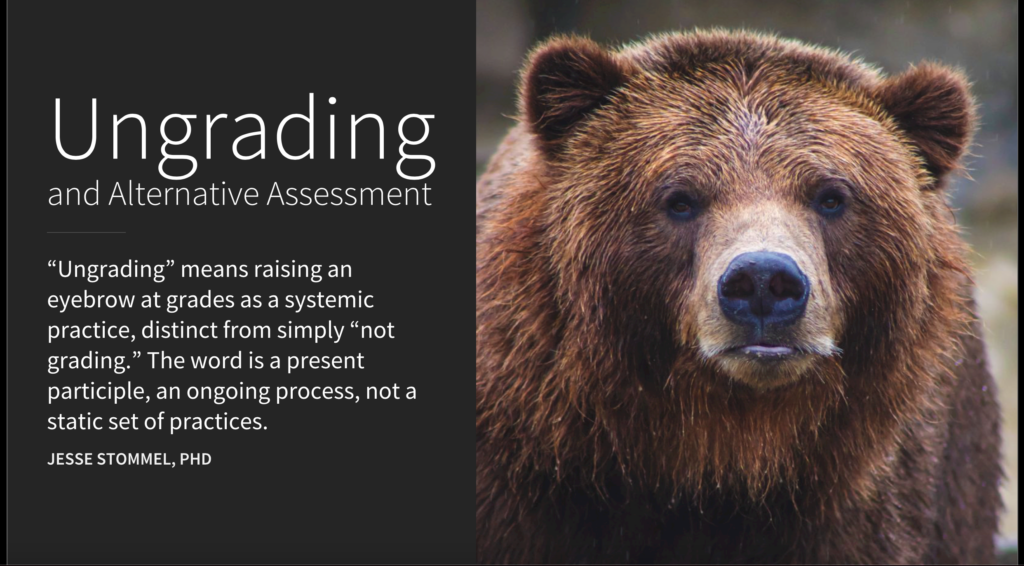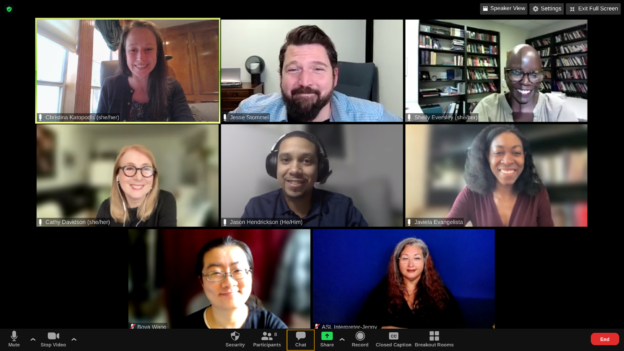In his workshop on March 21st, Dr. Jesse Stommel educated participants about the history of grading and the practice of ungrading. Kaz Elpharin, a current student at LaGuardia Community College, began the event by introducing Dr. Stommel.
Dr. Stommel emphasized that ungrading is not a static concept but an ongoing conversation and practice that should include students. He brought up the compassionate grading policies introduced during the pandemic, asking why they haven’t always been present and if they could be maintained. He brought in open questions such as why we grade, who it’s for, and what if we didn’t, while acknowledging the precarity of many professors and administrative constraints.
Dr. Stommel also gave background on bias in grading and how inclusive practices means designing classes for the least privileged. He shared how past negative experiences with grading and teachers often impact the relationship students have with their professors, and how discussing such realities and making assessments flexible and responsive can be reparative. He shared information on intrinsic versus extrinsic motivations, and how we can best support all students in learning instead of engaging in policing behavior, defining grading as a relatively recent technology. Dr. Stommel discussed the importance of context, that he doesn’t want all professors to simply use his forms of assessment in their classes, but instead open up a reflective dialogue on grading with their students. He ended the lecture portion insisting that effective education requires some necessary conditions, including equitable labor practices and meeting the basic needs of students, such as food and housing.
Dr. Stommel then moved into a writing exercise, asking participants:
“Who do you teach? What do you know about your students? How are they changing? What do they want from their education? What barriers do they face?”
After participants shared their responses in a brief discussion, he gave another prompt, asking everyone to draft a “Dear Students,” message for the top of their syllabi, thinking about:
“What work do you value from your students? What will you contribute (as the teacher)? What does success look like in your class? How (as the teacher) will you know when you’ve seen it? What is the students’ collective role in constructing the course? How will you show care for your students? How will you show care for yourself?”
He shared a resources on basic needs syllabus statements and included an example of his own basic needs statement.
This led into another discussion and question and answer portion, so engaging that it continued after the event in an “Afterparty” conversation in a Google Doc created by Pedagogy Co-Leaders Javiela Evangelista and Jason Hendrickson.
Dr. Stommel was very generous in encouraging participants to share his ideas at future workshops. He shared his slides:

and included OCR enabled slides.
He also shared his workshop notes, which include an overview of the session and additional resources.
We’d also like to share the generative conversation that took place at the Q&A Afterparty.
If you’re interested in more events on ungrading and alternative assessment, the Spring 2022 Mellon TLH Faculty Fellows have organized an interactive workshop with their students on “Adventures in Ungrading” for April 27, 2022, at 4-5pm ET. RSVP here.


